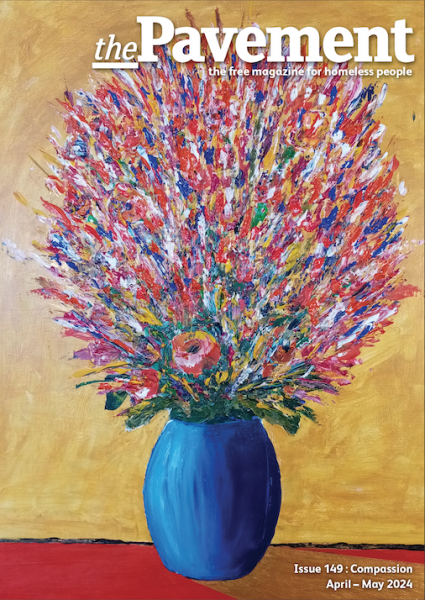
Established 2005 Registered Charity No. 1110656
Scottish Charity Register No. SC043760
DONATE
RECENT TWEETS
Living on the streets is a cycle that is very difficult to find a way out of, says Christopher Ubsell. After spending 10 years sleeping rough, he made escaping the cycle into an all-consuming obsession. Here’s what he found out on the way:
1. The majority of day centres have food; washing facilities and showers; things to do during the day; and, most importantly, key workers. My favourites in London are Ace of Clubs in Clapham, The Connection at St Martin’s and The Manna in London Bridge. Find those local to you in the Pavement’s listings. The people who work in these centres want to help and mostly have the ability to refer you to hostels and other specialist services. Ask for the help. Tell them you want to see somebody. The centres will have computers as well, so you can do your own research, and phones, so you can ring around.
2. You’re going to have to take the initiative here. Get help for issues with addiction and/or crime – I’ve had experience of both. Don’t just expect that you’ll sign on the dotted line and they’ll give you a place to live. You have to do the research and the legwork. You won’t get it on a plate.
3. Libraries ain’t just there for show either. You can access computers too, so go inside and find the wealth of information at your fingertips.
4. Set up an email address and try to buy a phone. People need to be able to contact you – the Council, day centre workers, maybe probation. You can claim JSA and other benefits using the day centre address to help with the costs of a mobile and you can find one from as little as £14 (with £10 credit) from well-known retailers. Charge it at the library or any public building with plug sockets such as the Royal Festival Hall in London. Mail from potential landlords can also be directed to the day centre.
5. If you do get intel about any direct-access hostels in your area, apply for all of them. They will usually keep you there for anything from a couple of weeks to three months before moving you onto somewhere a little more permanent but not quite.
6. If you do end up on the streets, try to sleep out in the open. It sounds daft, but you have to weigh up the risk of being attacked against the need to be seen by an outreach worker. This is by far the quickest method of getting help. I went online in the library and reported myself as sleeping rough in Lambeth. This can be done anonymously. Within a couple of days, they had come by and woken me up for a chat. Unfortunately, the emergency accommodation in Lambeth was reserved for those with drug issues, a category I didn’t fall into, so it was back to the drawing board, but you may have a little more luck in your area. Council outreach teams can be contacted through their websites.
7. Try to avoid being drunk or high in areas that are regularly patrolled by the police. And stay clean and warm, as these two components are, without doubt, the most important. Pay special attention to your feet and extremities.
8. Above all else, be proactive. See every new person you speak to as an opportunity to gain vital information. Other homeless people have info to offer, too, even if it’s something simple like the time and location of a food run. And make sure you always get a copy of the Pavement.
9. Private landlords sometimes take you on directly from the streets if you are entitled to Housing Benefit. Some charities that will pay the deposit or rent in advance. Finding these landlords is usually the hard part. Councils used to have lists of them, but they stopped doing this. The best thing is to search online for a day centre with workers that have used these schemes before.
10. Don’t put off until tomorrow what can be done today.
Good luck – you’ll get there!
Next: Body and soul.
April – May 2024 : Compassion
CONTENTS
BACK ISSUES
- Issue 149 : April – May 2024 : Compassion
- Issue 148 : February – March 2024 : The little things
- Issue 147 : December 2023 – January 2024 : Next steps
- Issue 146 : October 2023 – November 2023 : Kind acts
- Issue 145 : August 2023 – September 2023 : Mental health
- Issue 144 : June 2023 – July 2023 : Community
- Issue 143 : April 2023 - May 2023 : Hope springs
- Issue 142 : February 2023 - March 2023 : New Beginnings
- Issue 141 : December 2022 - January 2023 : Winter Homeless
- Issue 140 : October - November 2022 : Resolve
- Issue 139 : August - September 2022 : Creativity
- Issue 138 : June - July 2022 : Practical advice
- Issue 137 : April - May 2022 : Connection
- Issue 136 : February - March 2022 : RESPECT
- Issue 135 : Dec 2021 - Jan 2022 : OPPORTUNITY
- Issue 134 : September-October 2021 : Losses and gains
- Issue 133 : July-August 2021 : Know Your Rights
- Issue 132 : May-June 2021 : Access to Healthcare
- Issue 131 : Mar-Apr 2021 : SOLUTIONS
- Issue 130 : Jan-Feb 2021 : CHANGE
- Issue 129 : Nov-Dec 2020 : UNBELIEVABLE
- Issue 128 : Sep-Oct 2020 : COPING
- Issue 127 : Jul-Aug 2020 : HOPE
- Issue 126 : Health & Wellbeing in a Crisis
- Issue 125 : Mar-Apr 2020 : MOVING ON
- Issue 124 : Jan-Feb 2020 : STREET FOOD
- Issue 123 : Nov-Dec 2019 : HOSTELS
- Issue 122 : Sep 2019 : DEATH ON THE STREETS
- Issue 121 : July-Aug 2019 : INVISIBLE YOUTH
- Issue 120 : May-June 2019 : RECOVERY
- Issue 119 : Mar-Apr 2019 : WELLBEING
- Issue 118 : Jan-Feb 2019 : WORKING HOMELESS
- Issue 117 : Nov-Dec 2018 : HER STORY
- Issue 116 : Sept-Oct 2018 : TOILET TALK
- Issue 115 : July-Aug 2018 : HIDDEN HOMELESS
- Issue 114 : May-Jun 2018 : REBUILD YOUR LIFE
- Issue 113 : Mar–Apr 2018 : REMEMBRANCE
- Issue 112 : Jan-Feb 2018
- Issue 111 : Nov-Dec 2017
- Issue 110 : Sept-Oct 2017
- Issue 109 : July-Aug 2017
- Issue 108 : Apr-May 2017
- Issue 107 : Feb-Mar 2017
- Issue 106 : Dec 2016 - Jan 2017
- Issue 105 : Oct-Nov 2016
- Issue 104 : Aug-Sept 2016
- Issue 103 : May-June 2016
- Issue 102 : Mar-Apr 2016
- Issue 101 : Jan-Feb 2016
- Issue 100 : Nov-Dec 2015
- Issue 99 : Sept-Oct 2015
- Issue 98 : July-Aug 2015
- Issue 97 : May-Jun 2015
- Issue 96 : April 2015 [Mini Issue]
- Issue 95 : March 2015
- Issue 94 : February 2015
- Issue 93 : December 2014
- Issue 92 : November 2014
- Issue 91 : October 2014
- Issue 90 : September 2014
- Issue 89 : July 2014
- Issue 88 : June 2014
- Issue 87 : May 2014
- Issue 86 : April 2014
- Issue 85 : March 2014
- Issue 84 : February 2014
- Issue 83 : December 2013
- Issue 82 : November 2013
- Issue 81 : October 2013
- Issue 80 : September 2013
- Issue 79 : June 2013
- Issue 78 : 78
- Issue 77 : 77
- Issue 76 : 76
- Issue 75 : 75
- Issue 74 : 74
- Issue 73 : 73
- Issue 72 : 72
- Issue 71 : 71
- Issue 70 : 70
- Issue 69 : 69
- Issue 68 : 68
- Issue 67 : 67
- Issue 66 : 66
- Issue 65 : 65
- Issue 64 : 64
- Issue 63 : 63
- Issue 62 : 62
- Issue 61 : 61
- Issue 60 : 60
- Issue 59 : 59
- Issue 58 : 58
- Issue 57 : 57
- Issue 56 : 56
- Issue 56 : 56
- Issue 55 : 55
- Issue 54 : 54
- Issue 53 : 53
- Issue 52 : 52
- Issue 51 : 51
- Issue 50 : 50
- Issue 49 : 49
- Issue 48 : 48
- Issue 47 : 47
- Issue 46 : 46
- Issue 45 : 45
- Issue 44 : 44
- Issue 43 : 43
- Issue 42 : 42
- Issue 5 : 05
- Issue 4 : 04
- Issue 2 : 02
- Issue 1 : 01
- Issue 41 : 41
- Issue 40 : 40
- Issue 39 : 39
- Issue 38 : 38
- Issue 37 : 37
- Issue 36 : 36
- Issue 35 : 35
- Issue 34 : 34
- Issue 33 : 33
- Issue 10 : 10
- Issue 9 : 09
- Issue 6 : 06
- Issue 3 : 03
- Issue 32 : 32
- Issue 31 : 31
- Issue 30 : 30
- Issue 29 : 29
- Issue 11 : 11
- Issue 12 : 12
- Issue 13 : 13
- Issue 14 : 14
- Issue 15 : 15
- Issue 16 : 16
- Issue 17 : 17
- Issue 18 : 18
- Issue 19 : 19
- Issue 20 : 20
- Issue 21 : 21
- Issue 22 : 22
- Issue 23 : 23
- Issue 24 : 24
- Issue 25 : 25
- Issue 8 : 08
- Issue 7 : 07
- Issue 26 : 26
- Issue 27 : 27
- Issue 28 : 28
- Issue 1 : 01

